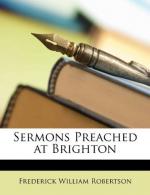1 Tim. i. 8.—“But we know
that the law is good, if a man
use it lawfully.”
246
SERMON XX.
Preached February 21, 1853.
The prodigal and his brother.
Luke xv. 31, 32.—“And he said
unto him, Son, thou art ever
with me, and all that I have is
thine. It was meet that we should
make merry, and be glad: for
this thy brother was dead, and is
alive again; was lost, and is found.”
253
SERMON XXI.
Preached May 15, 1853.
John’s rebuke of Herod.
Luke iii. 19, 20.—“But
Herod the tetrarch, being reproved
by him for Herodias, his brother
Philip’s wife, and for all the
evils which Herod had done, added
yet this above all, that he shut
up John in prison.”
270
Sermons.
I.
Preached April 28, 1850.
The tongue.
“Even so the tongue is a little member, and boasteth great things. Behold, how great a matter a little fire kindleth! And the tongue is a fire, a world of iniquity: so is the tongue among our members, that it defileth the whole body, and setteth on fire the course of nature; and it is set on fire of hell.”—St. James iii. 5-6.
In the development of Christian Truth a peculiar
office was assigned
to the Apostle James.
It was given to St. Paul to proclaim Christianity as the spiritual law of liberty, and to exhibit Faith as the most active principle within the breast of man. It was St. John’s to say that the deepest quality in the bosom of Deity is Love; and to assert that the life of God in Man is Love. It was the office of St. James to assert the necessity of Moral Rectitude; his very name marked him out peculiarly for this office: he was emphatically called, “the Just:” integrity was his peculiar characteristic. A man singularly honest, earnest, real. Accordingly, if you read through his whole epistle, you will find it is, from first to last, one continued vindication of the first principles of morality against the semblances of religion.
He protested against the censoriousness which was found connected with peculiar claims of religious feelings. “If any man among you seem to be religious and bridleth not his tongue, but deceiveth his own heart, this man’s religion is vain.” He protested against that spirit which had crept into the Christian Brotherhood, truckling to the rich, and despising the poor. “If ye have respect of persons ye commit sin, and are convinced of the law as transgressors.” He protested against that sentimental fatalism which induced men to throw the blame of their own passions upon God. “Let no man say, when he is tempted,




